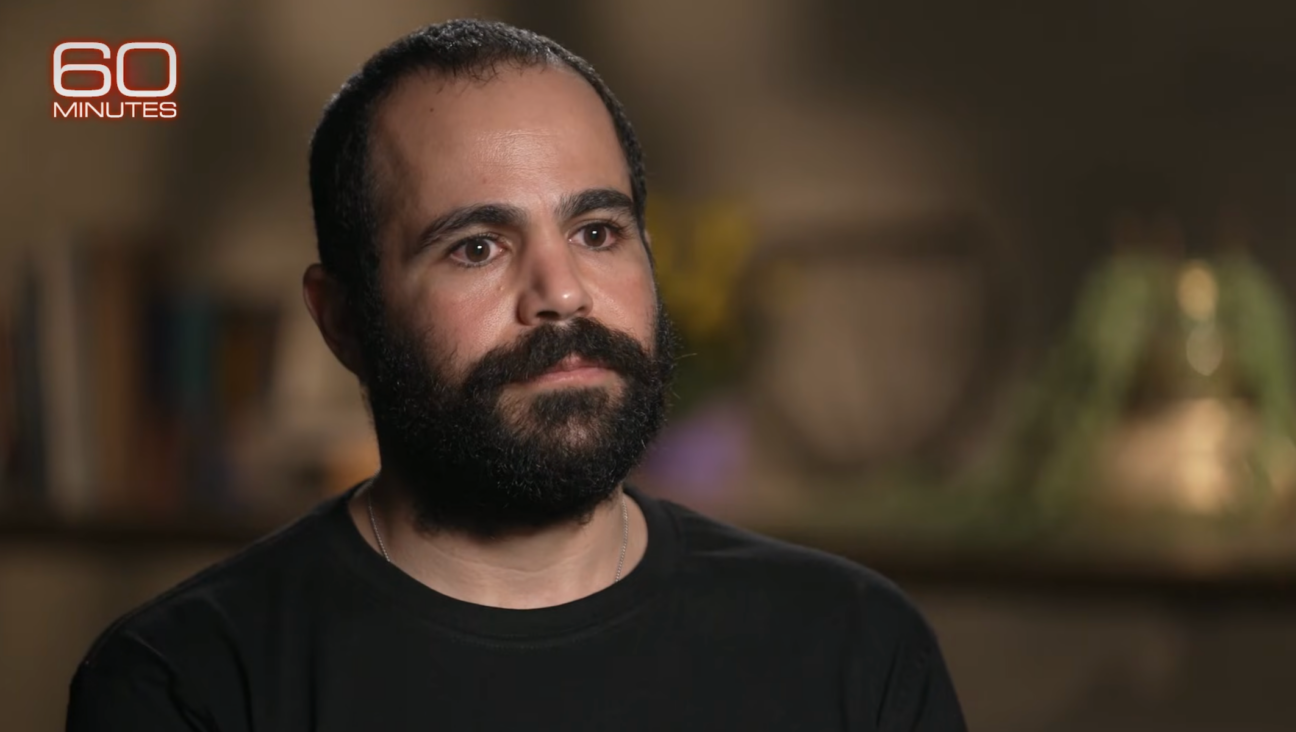Joe-Bashing and the Jews
Antisemitism on the Internet is nothing new. Neither are liberal attacks on Senator Joseph Lieberman, the hawkish former Democrat from Connecticut. It’s tempting, therefore, to pooh-pooh as same-old-same-old the odious Jew-bashing that popped up amid the mass Joe-bashing flooding the Web this week in the wake of Lieberman’s endorsement of Republican John McCain for president.
It’s tempting, but wrong. This isn’t the familiar fringe bigotry that we’re accustomed to tut-tutting and then ignoring. This is something newer and more alarming.
It is true that antisemitic conspiracy-mongering has been a feature of the Internet since the Web’s inception, both in fringe chat rooms and in individual postings to mainstream news sites. What is new in this week’s fireworks is the seeming normality, even respectability, of anti-Jewish conspiracy theories.
In other times, charges of Israeli plotting, Jewish disloyalty and Zionist control of Washington crept lamely into public discourse, only to be ignored or ridiculed by the mainstream. This week, claims of Jewish treachery were a mainstream thread in nearly every online discussion of the Lieberman-McCain brouhaha.
The claims appeared repeatedly, insistently, in the talkback sections of the most respectable news and opinion Web sites, from The Huffington Post and Think Progress to CNN, The Atlantic and AOL News. Saner discussants challenged them, for the most part, not contemptuously but respectfully, as though these were unremarkable, unobjectionable views.
The Jew-bashers answered their critics not by slinking away but by defending themselves confidently and even throwing back the challenge. Other participants sprang to their defense. They behaved and were received, it seemed, not as solitary crackpots but as a serious faction in the general debate.
This public festival of Jew-bashing is not a sudden or isolated phenomenon but part of a larger shift in the culture. As we have argued before, accusations of Jewish political dominance have been steadily gaining visibility and respectability since the run-up to the Iraq War five years ago. It’s now commonplace in some arenas, including academia, journalism and political activism, though not yet in electoral politics, to accuse Israel and its advocates of subverting American policy, bullying their critics and suppressing open discussion of the issues.
Those last accusations — bullying and stifling criticism — are crucial to the overall effectiveness of the onslaught. And it is an onslaught, a skirmish in the continuing Arab-Israeli conflict, in which unthinking friends of the Middle East combatants are pitted against each other in an American war of words and influence.
Ironically, when Israel’s foes successfully present themselves as underdogs and victims of Jewish bullying, the very attempt by Jews to fight back becomes evidence for the prosecution. And the more the Jewish community’s advocates try to respond with their old, familiar weapons of self-defense — the historic claims of victimhood and vulnerability — the less effective the weapons become.
American Jews have long presented themselves as fighting allies of the embattled Jewish state. Now the other side is firing back, using the Jewish community’s own weapons. American Jews are caught off guard, unprepared for the counterattack.
If events continue on their current course, it’s not hard to imagine Jews in America finding themselves one day facing the same dilemma that confronted Jews 80 years ago: suspect in their neighbors’ eyes as an alien, threatening force, yet ironically helpless to defend themselves.
They are not there yet, by any yardstick, and they may never get there. American Jews still have vast resources. They have many more friends than enemies. But a critical milestone has been passed: The post-Holocaust taboo on demonization of Jews is very nearly gone.
Comfortable Jewish communities in Europe and elsewhere find themselves on the defensive in the face of Israel’s increasing unpopularity. America is not an island. Things here could stop where they are, or they could continue downhill.
It doesn’t help when the biggest Jewish representative bodies allow themselves and their community to be identified in the public eye with a discredited administration and a larger conservative movement in terminal meltdown. It doesn’t help when Jews ignore or deny Israel’s genuine shortcomings. It doesn’t help when they overreact to criticism — hostile, benign or just clumsy — and intimidate their critics into resentful silence, reinforcing their enemies’ worst stereotypes.
The Jewish community and its advocacy organizations could sit still and hope for the best, or they could act deliberately to alter the course of events. But if they wish to change the flow of events, they must find new strategies. The current ones aren’t working.
The Forward is free to read, but it isn’t free to produce

I hope you appreciated this article. Before you go, I’d like to ask you to please support the Forward.
At a time when other newsrooms are closing or cutting back, the Forward has removed its paywall and invested additional resources to report on the ground from Israel and around the U.S. on the impact of the war, rising antisemitism and polarized discourse.
Readers like you make it all possible. We’ve started our Passover Fundraising Drive, and we need 1,800 readers like you to step up to support the Forward by April 21. Members of the Forward board are even matching the first 1,000 gifts, up to $70,000.
This is a great time to support independent Jewish journalism, because every dollar goes twice as far.
— Rachel Fishman Feddersen, Publisher and CEO
2X match on all Passover gifts!
Most Popular
- 1

Film & TV What Gal Gadot has said about the Israeli-Palestinian conflict
- 2

News A Jewish Republican and Muslim Democrat are suddenly in a tight race for a special seat in Congress
- 3

Culture How two Jewish names — Kohen and Mira — are dividing red and blue states
- 4

Opinion Mike Huckabee said there’s ‘no such thing as a Palestinian.’ It’s worth thinking about what that means
In Case You Missed It
-

Fast Forward The NCAA men’s Final Four has 3 Jewish coaches
-

Fast Forward Yarden Bibas says ‘I am here because of Trump’ and pleads with him to stop the Gaza war
-

Fast Forward Trump’s plan to enlist Elon Musk began at Lubavitcher Rebbe’s grave
-

Film & TV In this Jewish family, everybody needs therapy — especially the therapists themselves
-
Shop the Forward Store
100% of profits support our journalism
Republish This Story
Please read before republishing
We’re happy to make this story available to republish for free, unless it originated with JTA, Haaretz or another publication (as indicated on the article) and as long as you follow our guidelines.
You must comply with the following:
- Credit the Forward
- Retain our pixel
- Preserve our canonical link in Google search
- Add a noindex tag in Google search
See our full guidelines for more information, and this guide for detail about canonical URLs.
To republish, copy the HTML by clicking on the yellow button to the right; it includes our tracking pixel, all paragraph styles and hyperlinks, the author byline and credit to the Forward. It does not include images; to avoid copyright violations, you must add them manually, following our guidelines. Please email us at [email protected], subject line “republish,” with any questions or to let us know what stories you’re picking up.















